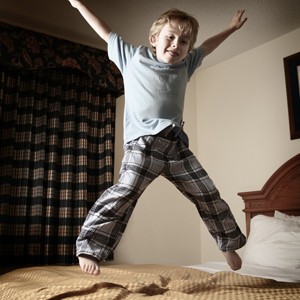What has jumping got to do with learning to read and spell? Good question!
If you have ever been abroad or heard a foreign language being spoken, it can be difficult to pick out the individual words
It’s like that for young children – they don’t always know consciously where one word ends and another starts. And this is really important for later literacy
Sounds boring? Nothing to do with play?
Today our Speech and Language Therapy colleagues have come up with a great set of games for learning about word boundaries. Once you get going, be warned, your child may not want to stop!
If your child does not get the idea, or does not enjoy it – never mind. Cuddle up and read a favourite story instead, it is just as good!


















